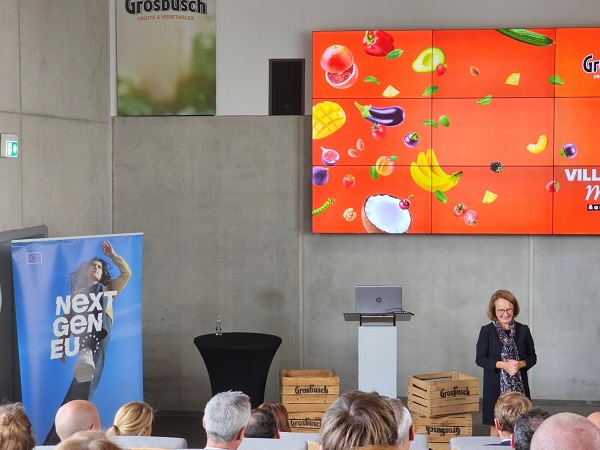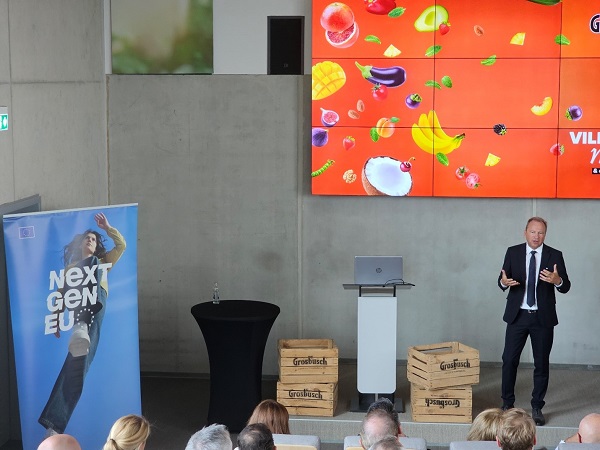 Céline Gauer, Head of the European Recovery and Resilience Task Force;
Credit: John Chalmers/Chronicle.lu
Céline Gauer, Head of the European Recovery and Resilience Task Force;
Credit: John Chalmers/Chronicle.lu
On Tuesday 17 September 2024, at a press conference held at the offices of wholesale greengrocer Grosbusch in Ellange, and in the presence of the Head of the European Recovery and Resilience Task Force Céline Gauer, Minister of Finance Gilles Roth and Minister of the Economy, SMEs, Energy and Tourism Lex Delles, an update was given on the EU's support for Luxembourg's Recovery and Resilience Plan.
At EU level, a temporary recovery instrument known as NextGenerationEU (NGEU), and potentially worth €750 billion divided almost equally between grants and long-term loans, was launched at the end of 2020 initially to support EU member states' recovery from the impacts of COVID-19. It is planned to run until 2026. The centrepiece of the NGEU instrument is the Recovery and Resilience Facility (RRF), earmarked since February 2021 to make available €648 billion in grants and loans for projects undertaken by Member States relating to making their economies and societies more sustainable and resilient to the impacts of outside forces, particularly in the light of the green and digital initiatives agreed at EU level. Each government, including Luxembourg's, has to submit its own national recovery and resilience plan, which must allocate a minimum of 37% of its budget towards green measures, and a further 20% towards digital measures in order to be able to benefit from the EU funding. It is performance based, meaning that all activities sanctioned within the plan, and all monies spent on those activities, must be demonstrably seen to have been achieved and money correctly spent before the EU retrospectively reimburses the state. The EU also maintains a website covering each country's "RRF Profile", which for Luxembourg can be found here.
One of the cornerstones of the RRF is the REPowerEU Plan, which targets rapidly removing the EU's dependence on Russian fossil fuels following its invasion of Ukraine and the subsequent disruption of the world's energy supply chains. It seeks to mesh with the "Fit for 55" proposals aimed at reducing net greenhouse gas emissions by 55% by 2030 by encouraging more efficient energy use and transitioning to greener locally generated energy sources among other things.
Each member state has its own REPowerEU plan, and Luxembourg's plan was submitted as a chapter within its revised RRF, which in total is now worth €241.1 million in grants and was assessed positively by the EU on 23 July 2024. The plan, which triples the financial allocation and adds climate subsidies (Klimabonus Wunnen, Klimabonus Mobiliteit and solar panels for self-consumption in business premises) will be formally approved on 23 September 2024 and means that all Klimabonus state aids (for example electric car subsidies, replacement of fossil fuel boilers, solar panel installation, house insulation, etc.) will now be paid for by the EU, although in reality that will not change the way in which individual households will apply for subsidies, nor will it cover any additional subsidies provided by individual municipalities.
As referenced above, these subsidies also apply to businesses for self-consumption, and Grosbusch have benefiited by investing over €1 million on 8,000 solar panels which now provide 50% of all their energy needs.
Another Luxembourg SME, Rotomade SA, is receiving support from the RRF, which is also co-financing its solar panel installation.

(Pictured: Gilles Roth, Luxembourg's Minister of Finance; Credit: John Chalmers/Chronicle.lu)








